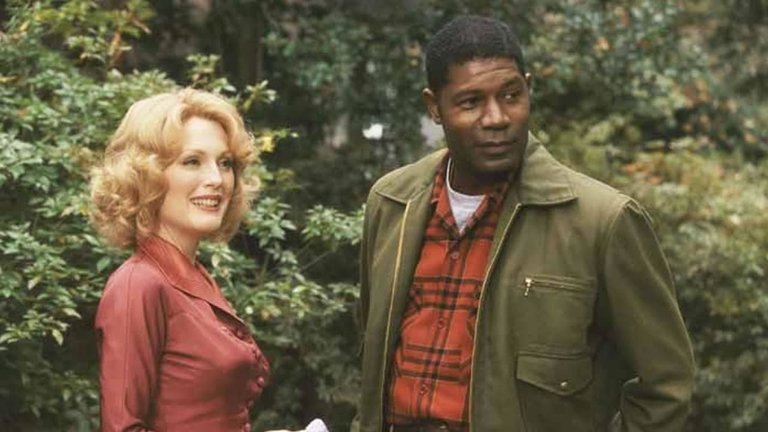
Todd Haynes is a film maker which began career with for unusual and transgressive films that often crossed the line of controversy and led to protests and lawsuits. To general audience, however, he became known only through his more conventional film Velvet Goldmine "in which he celebrated early 1970s glam rock and its rebellious stars that practised alternative forms of sexuality. His next film, 2002 period drama Far from Heaven, was, set in milieu which, at least superficially, represented the anti-thesis of everything depicted in Velvet Goldmine.
The film begins in 1957 in Hartford, a small town in the state of Connecticut. Much like the rest of the nation, Hartford residents enjoy the prosperity of the Eisenhower era that is best embodied by the Whitaker couple. Frank (played by Dennis Quaid) is a successful director of a marketing company, and his beautiful wife Cathy (played by Julianne Moore) so popular among the local elite that she is often reported the social section of local newspapers. Since their two children are too small to be interested in rock’n’roll, beat poetry, or some other forms of social pathology, Whitakers seem to be the epitome of the American Dream. But that idyll has a dark side. Frank drinks more and more, spends less and less time at home, and he also stopped sharing a bed with his wife. Cathy will soon discover the reason for this when she takes a lunch to her husband at the office and there catches him in flagranti delicto with a man. Cathy is shocked, disgusted and hurt, and Frank, frustrated by the failed attempts to cure his “problem,” gradually becomes violent. Cathy therefore begins to find comfort in company of Raymond Deagan's (played by Dennis Haysbert), a humble gardener who fascinates her more and more with his erudition and healthy attitude towards life. Cathy eventually becomes aware that according she cultivates little more than friendly feelings towards Deagan, but the problem is that he is black, and even in the supposedly enlightened northern city, any connection between a black man and a white woman is a potential scandal.
There are almost no critics who, describing 'Far from Paradise', did not mention that this film is a kind of dedication to 1950s Hollywood melodramas directed by Douglas Sirk – works that in their time were rejected by critics as a kitsch only to later be recognised as classics. Todd Haynes is not the first film maker who was impressed by Sirk's works. Famous German film maker Rainer Werner Fassbinder also based some of his most significant films on his reinterpretations of Sirk's classics. Much like Fassbinder, Haynes is a openly gay, but that could be hard to conclude in this film, at least based on the depiction of the phenomenon that was called "alternative lifestyle" in early 1950s, and which in 1950s had been exclusively in the domain of obscure psychiatric textbooks and criminal legislation. Haynes depicts homosexuality is as just one form of social pathology that was suppressed in Eisenhower's America in order to maintain the illusions of the petty-bourgeois idyll. The world where men wore hats and ties, wives stayed at home, and children with neat haircuts dutifully listened to their parents hid many problems - alcoholism, domestic violence, but also racism, even in those parts of America that were supposedly enlightened.
Modern directors, especially those who grew up in Clinton’s ultra-hedonistic and “politically correct” era would have turned Far from Heaven into cheap agitprop similar to Pleasantville. But Haynes is far more intelligent - he doesn’t hide the fact that things in the 1950s were far from ideal, but he doesn’t do it from the position of moral superiority. Instead, Far from Heaven approaches all of these themes almost in the same way film makers would have done in the 1950s - indirectly, leaving viewers to fill in the gaps and draw their own conclusions. This is precisely the greatest value of Far from Heaven - it in no way seeks to distinguish it from Sirk's melodramas (and the plot is in many ways "borrowed" from All That Heaven Allows). Apart from its main theme ( homosexualism that became a legitimate theme in Hollywood only in the 1960s ) and occasionally swearing there is nothing to suggest that the film was not shot in Mad Men era. The vocabulary is authentic, production designer Mark Friedberg and costume designer Sandy Powell faithfully reconstruct all the details from that period, and composer Elmer Bernstein completes the atmosphere with his soundtrack. Julianne Moore, who, in an effort to better suit the American wife's ideal, dyed her hair blonde, plays the lead role perfectly, while Dennis Quaid did well in the atypical and potentially thankless role of a violent and hypocritical husband. A rather pleasant surprise is represented by Denis Haysbert who also gives his role dignity, and Patricia Clarkson is also effective in the role of Cathy’s best friend. Far from Heaven could have been even better had Haynes abstained from couple of scenes that repeat the thesis that American society was racist. Because of this that, the suspension of disbelief is broken and the viewer might get impression of watching exercise in style instead of real film. But even with such flaws, Far from Heaven is a fine example of a film skill as is rarely seen in Hollywood today and it truly deserves the attention of the audience.
RATING: 7/10 (+++)
Blog in Croatian https://draxblog.com
Blog in English https://draxreview.wordpress.com/
Leofinance blog https://leofinance.io/@drax.leo
Unstoppable Domains: https://unstoppabledomains.com/?ref=3fc23fc42c1b417
Hiveonboard: https://hiveonboard.com?ref=drax y
Bitcoin Lightning HIVE donations: https://v4v.app/v1/lnurlp/qrcode/drax
Rising Star game: https://www.risingstargame.com?referrer=drax
1Inch: https://1inch.exchange/#/r/0x83823d8CCB74F828148258BB4457642124b1328e
BTC donations: 1EWxiMiP6iiG9rger3NuUSd6HByaxQWafG
ETH donations: 0xB305F144323b99e6f8b1d66f5D7DE78B498C32A7